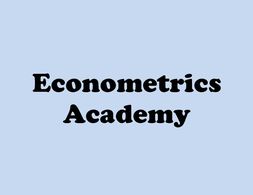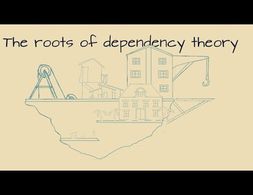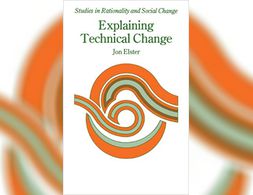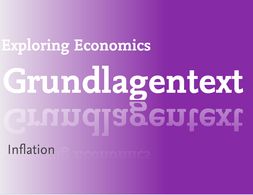892 Ergebnisse
There are three things one can do in this website - 1. Learn 2. Help Teach 3. Sign up MOOC. This is a semester-long graduate course in Econometrics. This course is intended for graduate students in economics-related fields and more generally in social sciences. The course includes an overview of the models and theory and applications using Stata, R, or SAS
programs. This econometrics class covers about 15 of the most commonly used econometric models in economics, such as linear regression, panel data models, probit and logit models, limited dependent variable models, count data models, time series models, and many more.
New Tools of Economic Dynamics gives an introduction and overview of recently developed methods and tools, most of them developed outside economics, to deal with the qualitative analysis of economic dynamics. It reports the results of a three-year research project by a European and Latin American network on the intersection of economics with mathematical, statistical, and computational methods and techniques.
The world has changed dramatically in recent years and so has the field of economics, but many introductory economics textbooks have remained stuck in the past. This book provides a new beginning for the study of macroeconomics, fundamentally international in its approach and emphasizing current debates and research trends.
Karl William Kapp (1910-1976) was one of the forefathers of Ecological Economics. Influenced namely by the Frankfurt School, Institutionalist Economics and Pragmatist Philosophy, he contributed to debates on the social costs of production, economic planning, sustainable development and epistemology. I
This chapter discusses the role of gender in economic relations, processes, and outcomes. Gender differences in economic outcomes such as labor force participation and wages have received growing attention from economists in the last several decades – a positive and much needed development in economic thinking.
This content submission has two parts: (1) a link to the post by Wolf Richter on deterioration of US subprime credit card debt and loans, driven in part by the overuse of hedonic quality adjustments in the Consumer Price Index (CPI) used by the US Bureau of Labor Statistics, and (2) to introduce Exploring Economics to the website Naked Capitalism, which is an effort to promote critical thinking through the medium of a finance and economics blog and fearless commentary.
Developmental economics
Technical change, defined as the manufacture and modification of tools, is generally thought to have played an important role in the evolution of intelligent life on earth, comparable to that of language. In this volume, first published in 1983, Jon Elster approaches the study of technical change from an epistemological perspective.
Der Fokus der Institutionenökonomik liegt auf der Rolle von sozialen Institutionen, wie Verträgen, Gesetzen oder auch Verhaltensweisen, in der Produktion, der Verteilung und dem Konsum sowie auf den aus ihnen resultierenden sozialen Beziehungen.
Der Fokus des Postkeynesianismus liegt auf der Analyse kapitalistischer Ökonomien. Diese werden als sehr produktive, jedoch instabile und konfliktive Systeme angesehen. Wirtschaftliche Aktivität wird von der effektiven Nachfrage bestimmt, die in der Regel keine Vollbeschäftigung und Vollauslastung der Kapazitäten garantieren kann.
Hannes Vetter hat sich in Rahmen der Schreibwerkstatt "Varieties of Mainstream Economics?" mit der Evaluation der Bewertung von Umwelt in neoklassischen Makromodellen auseinandergesetzt.
The Covid-19 pandemic has laid bare the deep structural rifts in modern capitalist economies. It has exposed and exacerbated the long-lasting systemic inequalities in income, wealth, healthcare, housing, and other aspects of economic success across a variety of dimensions including class, gender, race, regions, and nations. This workshop explores the causes of economic inequality in contemporary capitalist economies and its consequences for the economy and society in the post-pandemic reality, as well as what steps can be taken to alleviate economic inequality in the future. Drawing from a variety of theoretical and interdisciplinary insights, the workshop encourages you to reflect on your personal experiences of inequality and aims to challenge the way in which the issue is typically approached in economics.
After completing the module, participants should be able to analyse the concepts of degrowth, ecological unequal exchange, Green New Deal, and embeddedness by applying theories situated within the fields of academic research of Ecological Economics and Political Ecology.
Der Fokus der Verhaltensökonomik liegt auf dem beobachtbaren Verhalten von Menschen und deren Entscheidungen.
Markets are the focus in modern economics: when they work, when they don’t and what we can or can’t do about it. There are many ways to study markets and how we do so will inevitably affect our conclusions about them, including policy recommendations which can influence governments and other major organisations. Pluralism can be a vital corrective to enacting real policies based on only one perspective and a plethora of approaches provide alternatives to the canonical view. Although they have differing implications, these approaches share the idea that we should take a historical approach, analysing markets on a case-by-case basis; and they share a faith in the power of both individuals and collectives to overcome the problems encountered when organising economic activity.
How can we establish new institutions and practices in order to use fare-free public transport as a beacon for sustainable mobility and a low-carbon lifestyle? The author of this essay elaborates on how practice theory and institutional economics can help to answer this question.
Overview page for the collection of nobel laureateas on Exploring Economics
Approaching the law of nature that determines all forms of economy. The bulk of economic theory addresses the economic process by setting out on a catalogue of aspects, seeking the laws in the aspects and hoping to get together a reliable view of the whole.
In der Lehrveranstaltung „Plurale Feministischen Ökonomie“ erhalten die Studierenden einen Einblick in die unterschiedlichen Debatten innerhalb der Feministischen Ökonomie, die von der Subsistenztheorie bis hin zur Queer Economics reichen, und lernen die wissenschaftstheoretischen, normativen und methodischen Hintergründe kennen.
Was ist Inflation? Warum ist sie relevant? Und gibt es eine einheitliche Theorie über ihre Wurzeln und Ursachen, oder ist sie ein umstrittenes Konzept? Genau darum geht es in diesem Text: Wir definieren, was Inflation eigentlich bedeutet, bevor wir uns mit einem interdisziplinären und pluralistischen Ansatz in die theoretische Debatte stürzen: Wie entsteht sie, welche Faktoren können sie beeinflussen, und was kann man dagegen tun?
Manuel Schulz hat sich im Rahmen der Schreibwerkstatt "Varieties of Mainstream Economics?" kritisch mit dem normativen Selbstverständnis der Verhaltensökonomik auseinandergesetzt.
How do people make decisions? There is a class of models in psychology which seek to answer this question but have received scant attention in economics despite some clear empirical successes. In a previous post I discussed one of these, Decision by Sampling, and this post will look at another: the so-called Fast and Frugal heuristics pioneered by the German psychologist Gerd Gigerenzer. Here the individual seeks out sufficient information to make a reasonable decision. They are ‘fast’ because they do not require massive computational effort to make a decision so can be done in seconds, and they are ‘frugal’ because they use as little information as possible to make the decision effectively.
Michael Kalecki famously remarked “I have found out what economics is; it is the science of confusing stocks with flows”. Stock-Flow Consistent (SFC) models were developed precisely to address this kind of confusion. The basic intuition of SFC models is that the economy is built up as a set of intersecting balance sheets, where transactions between entities are called flows and the value of the assets/liabilities they hold are called stocks. Wages are a flow; bank deposits are a stock, and confusing the two directly is a category error. In this edition of the pluralist showcase I will first describe the logic of SFC models – which is worth exploring in depth – before discussing empirical calibration and applications of the models. Warning that there is a little more maths in this post than usual (i.e. some), but you should be able to skip those parts and still easily get the picture.
Exploring Economics, an open-source e-learning platform, giving you the opportunity to discover & study a variety of economic theories, topics, and methods.
This is an introductory level core course in macroeconomics for those expecting to take further courses in economics. It provides a theoretical and applied approach of introductory macroeconomics, with an international perspective and applications to account for the growing importance of the global economy and the rising openness of economies.
An examination of women's changing economic roles. Includes an analysis of labour force participation, wage inequality, gender differences in education, intra-household distribution of resources, economics of reproduction, and how technological change affects women.
The 2007-2008 financial crisis exposed the shortcomings of mainstream economic theory with economists unprepared to deal with it. In the face of this, a major rethinking of economics seems necessary and in presenting alternative approaches to economic theory, this book contributes to the rebuilding of the discipline.
A systematic comparison of the three major economic theories, showing how they differ and why these differences matter in shaping economic theory and practice.
Contending Economic Theories offers a unique comparative treatment of the three main theories in economics as it is taught today: neoclassical, Keynesian, and Marxian. Each is developed and discussed in its own chapter, yet also differentiated from and compared to the other two theories.
Exploring Economics, an open-source e-learning platform, giving you the opportunity to discover & study a variety of economic theories, topics, and methods.
In the history of the social sciences, few individuals have exerted as much influence as has Jeremy Bentham. His attempt to become “the Newton of morals” has left a marked impression upon the methodology and form of analysis that social sciences like economics and political science have chosen as modus operandi.
A rethinking of the way to fight global poverty and winners of the Swedish Bank Prize for Economics.
Economists occupy leading positions in many different sectors including central and private banks, multinational corporations, the state and the media, as well as serving as policy consultants on everything from health to the environment and security. Power and Influence of Economists explores the interconnected relationship between power, knowledge and influence which has led economics to be both a source and beneficiary of widespread power and influence.
Wir nutzen Cookies. Klicke auf "Akzeptieren" um uns dabei zu helfen, Exploring Economics immer besser zu machen!




























